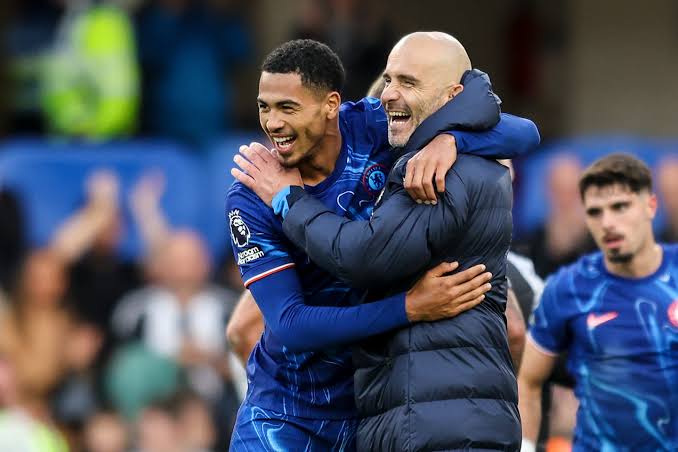The tension stems from a critical injury to key defender Levi Colwill, who suffered an anterior cruciate ligament (ACL) injury during training, sidelining him for the majority of the 2025-26 season.
This setback has disrupted Chelsea’s defensive plans, prompting Maresca to push for the signing of a new centre-back, a priority he believes is essential to maintain the team’s competitive edge.
However, the club’s hierarchy appears reluctant to dive back into the transfer market, preferring to rely on internal solutions for the upcoming Premier League opener against Crystal Palace.
Maresca, who guided Chelsea to Club World Cup success just a month ago, has been vocal about the importance of Colwill to the team’s playing style.
The 22-year-old England international was a cornerstone of Chelsea’s defensive structure last season, starting 35 Premier League matches and playing a pivotal role in the team’s build-up play. His ability to break lines and provide solutions from the central defensive position made him indispensable to Maresca’s tactical setup.
The manager’s frustration is palpable, as he has repeatedly emphasized the need for a new centre-back to fill the void left by Colwill. Despite Chelsea’s aggressive spending in the transfer window, which has seen them invest over £240 million in new signings, primarily attacking players, the board seems hesitant to allocate further funds for a defensive reinforcement.
The club’s current defensive options include Tosin Adarabioyo and Trevoh Chalobah, who are expected to start against Crystal Palace. Other players like Benoit Badiashile, Wesley Fofana, and young talent Josh Acheampong are available, but injuries and inexperience raise concerns. Badiashile is sidelined until September, Fofana’s fitness remains uncertain, and Acheampong, while promising, lacks the seasoned presence Colwill brought. Maresca has dismissed the idea of using summer signing Jorrel Hato as a direct replacement, noting that Hato, primarily a left-back, lacks experience in the central role critical to Chelsea’s system. The manager’s comments suggest a disconnect with the board, who appear confident in the squad’s depth despite these challenges.
Chelsea’s transfer strategy has been a point of contention, with the club focusing on attacking reinforcements like Liam Delap, Joao Pedro, and Jamie Gittens, while also pursuing high-profile targets such as RB Leipzig’s Xavi Simons and Manchester United’s Alejandro Garnacho.
Meanwhile, outgoings are also on the horizon, with Nicolas Jackson and Renato Veiga deemed surplus to requirements. Jackson, suspended for the Crystal Palace match, has been told he can leave, with interest from Newcastle and Italian clubs.
Veiga, despite Colwill’s injury creating a potential opportunity, is still expected to be sold. These moves reflect Chelsea’s broader squad management approach, which prioritizes financial balance through sales while addressing immediate needs.
Maresca’s public remarks highlight a broader philosophical clash with the board. He has expressed admiration for Colwill’s contributions, describing him as a “fantastic player” whose absence significantly alters the team’s preparation.
His plea for a new defender underscores the importance of a specific profile—a player capable of playing in the middle of a back three, orchestrating play from deep. However, the club’s reluctance to act, coupled with their focus on other areas of the squad, has left Maresca searching for solutions within a stretched defensive unit.
As Chelsea prepare to face Crystal Palace, the manager’s challenge is to adapt his tactics to a depleted backline while navigating ongoing tensions with the board over the club’s transfer priorities. The outcome of this standoff could shape Chelsea’s season and Maresca’s relationship with the club’s leadership.
